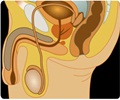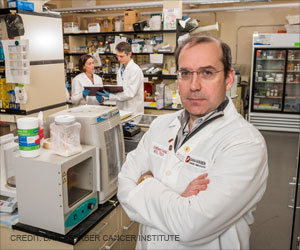A new class of drugs, JQ1, originally used as a contraceptive helps reduce tumor growth in combination with romidepsin, an already existing drug.
Highlights
- Testicular cancer can be treated but hardly responds to treatment.
- JQ1 belongs to a new class of drugs which blocks sperm maturation.
- Application of the //small-molecule inhibitor JQ1 is effective in tumour therapy, as it interferes with the function of bromodomain and extraterminal proteins.
The hereditary material DNA is similar to an extremely long strip of Morse code, on which the assembly instructions for the cellular molecules are found. To fit into the cell nuclei, this strip of Morse code is wrapped around small protein balls at regular intervals - the histones. Histones and DNA together resemble a string of pearls.
However, the histones do not only play a structural role. They also feature chemical tags - called methyl or acetyl groups. These tags signal to the synthesis machinery in the cell whether the strip of Morse code should be read at this point or not.
"JQ1 inhibits those proteins that read these histone marks and thus changes the gene activity in the cell," explains Prof. Hubert Schorle from the Institute for Pathology at the University of Bonn.
The cancer cells react very sensitive to these changes: they activate a suicide program, called apoptosis. "In a testicular cancer mouse model, the tumors began to shrink after administering JQ1," explains the lead author of the study, Sina Jostes. "In contrast, healthy skin cells seem to tolerate JQ1 very well."
"In our study, we treated mice with both JQ1 and romidepsin," explains Dr. Daniel Nettersheim, who helped in planning and performing the studies.
Reference
- Sina Jostes et al., The bromodomain inhibitor JQ1 triggers growth arrest and apoptosis in testicular germ cell tumours in vitro and in vivo, Journal of Cellular and Molecular Medicine (2016) http://dx.doi.org/10.1111/jcmm.13059.
Source-Medindia










